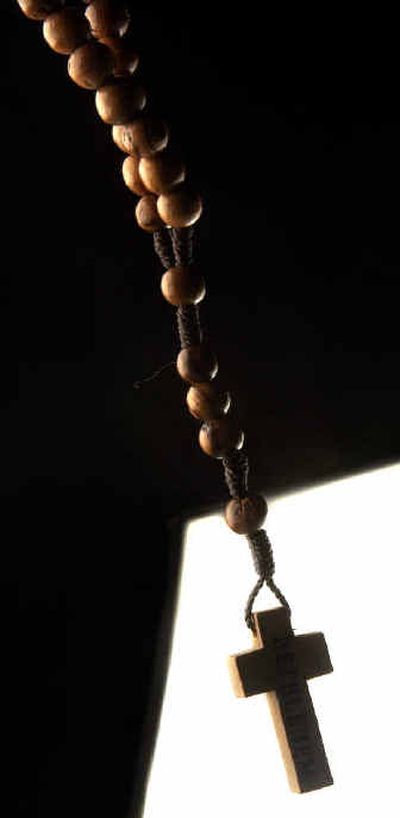Skylstad blends local, national roles

For confirmation or First Communion, children and young people in the Catholic Diocese of Spokane will receive a gift from their bishop – a wooden rosary with beads carved from olive trees, strung together by the hands of Christians in Bethlehem.
Bishop William Skylstad returned from the Holy Land earlier this year with thousands of rosaries. He wanted to support Arab Christians, who suffer from high unemployment as a result of the conflict and lack of tourism. He also wanted people in Eastern Washington to grasp the struggle for peace in that part of the world.
“It’s a way to show solidarity for the people,” said Skylstad, noting that Bethlehem’s unemployment rate is 65 percent.
As the new president of the U.S. Conference of Catholic Bishops, Skylstad’s many duties have included a weeklong visit to the Middle East in January to meet with leaders of Israel and the Palestinian Authority. He is likely the only person in Eastern Washington who has ever had a face-to-face meeting with Mahmoud Abbas, the newly elected president of the Palestinian Authority. Skylstad spoke to him just four days after his election.
“We were there for a historic moment,” said Skylstad, who added that he bumped into former President Carter, who was there to monitor the Palestinian elections.
While his own diocese is mired in bankruptcy proceedings, Skylstad continues to strike a balance between his duties in Eastern Washington and his role as leader of the hundreds of bishops in the United States.
Although he has been to the Holy Land about a half-dozen times, his most recent trip was his first as USCCB president. In that role and during all his overseas trips, Skylstad serves as an ambassador for American Catholics. He is also a voice for Catholics all over the world during ecumenical gatherings that involve the leaders of various faith groups and denominations.
Spokane’s bishop was chosen to speak with both Abbas and President Moshe Katsav of Israel on behalf of the members of the Episcopal Coordination for the Holy Land, an informal group made up of the Catholic bishops in North America and western Europe as well as the Council of Episcopal Conferences of Europe and the one in Latin America. Besides advocating on behalf of the Holy Land’s Christian community, the organization seeks to end the violence in the Middle East.
“At this important moment, we seek to encourage and support all who strive for justice and so pursue peace and those practical steps that will enable the Israeli and Palestinian peoples to live in this land, with dignity, in two states, in security and equity,” Skylstad said in a prepared statement to Abbas, two days after meeting with Katsav.
His message to the Palestinian leader mirrored his remarks to the Israeli president.
“We are determined that the issues which touch the lives and hopes of all in the Holy Land shall not be neglected,” he said to both of them.
Abbas, who replied in Arabic, decried the violence and appeared hopeful that peace could be re-established, Skylstad said. “There was a guarded sense of optimism,” recalled the bishop, “that they would stick to the roadmap for peace and not be distracted by violence.”
It was a far cry from his meeting two years ago with the late Palestinian leader Yasser Arafat, who, at the time, was imprisoned in his compound. Skylstad recalled how Arafat had bitter complaints about the treatment of Arabs.
During this latest visit, the bishop and others also met with people from all three religious groups in the region – Jews, Muslims and Christians – to learn more about the continued dialogue among them.
Skylstad said he was saddened to see the vast barricade erected along Israel’s border with the Palestinian West Bank. It has contributed to the high unemployment rate and the closing down of dozens of Palestinian businesses, he said. That’s another reason he bought so many rosaries – to provide these Arab Christians with a source of income during these low times.
“There is a feeling that Christians are abandoned,” said the bishop, who hopes to lead a pilgrimage or two to the Holy Land sometime in the future to encourage more tourism to the area.
Besides his trip to the Holy Land, Spokane’s bishop also traveled to Bogota, Colombia, in February along with bishops from Canada, Latin America and the United States. Among their topics of discussion, was the impact of globalization on the local cultures.
In April, he is scheduled to go to Rome, where he may meet with Pope John Paul II, depending on the pontiff’s health.
“It’s been busy, but manageable,” Skylstad said, describing his schedule, which includes numerous meetings and talks throughout the country. “These are challenging days in a lot of ways, and I ask for people’s prayers.”